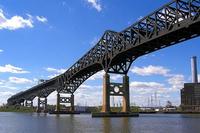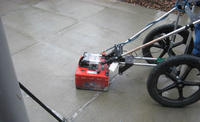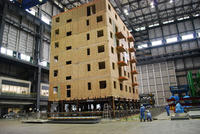-
Sensing technology helps prevent construction accidents
Researchers have developed a system that employs remote sensing technology to improve safety on construction sites by using tracking tags to monitor movements in real-time
-
-
Cyberattack disrupts Iran’s oil production system
The Iranian oil industrywas subject to cyber attack this past weekend,but the Iranian government saysit has contained and controlled the damage from the malware; this is the fourth known cyber attack on Iran’s civilian and military infrastructure
-
-
New Iowa bridge equipped with damage-detection gauges
A new Iowa bridge is equipped with sensors which provide a large amount of quantitative information about the bridge’s performance and condition; these gauges take 100 readings a second for corrosion, strain, surface conditions, moisture within the steel arch, and structure movements over time; the bridge is also equipped to monitor the security of the structure and to record surveillance video; it is a structure monitoring model that could be used for other new bridges, including much larger ones
-
-
Identifying the sources of global sea level rise
As the Earth’s climate warms, a melting ice sheet produces a distinct and highly non-uniform pattern of sea-level change, with sea level falling close to the melting ice sheet and rising progressively farther away. The pattern for each ice sheet is unique and is known as its sea level fingerprint; now, geophysicists have found a way to identify the sea level fingerprint left by a particular ice sheet
-
-
U.S. aging bridges in critical condition

There are an estimated 18,000 bridges in the United States that are classed as fracture-critical bridges, requiring continual inspections; the need for increased inspection and maintenance runs against shrinking state and federal budgets for infrastructure improvements; bridges must also be closed for maintenance – but at least for that there is now a solution: instant bridges
-
-
Honda to reuse rare Earth metals from used parts

Rare Earth elements are essential to advanced technological application and to green technology products; China controls 97 percent of the world’s production of these elements, and has been using its near-monopoly to hobble non-Chinese companies and for political blackmail; in response, two Japanese companies announce a new process allowing them to extract as much as 80 percent or more of rare Earth metals contained in used nickel-metal hydride batteries
-
-
Bridges get a quick check-up with new imaging technique

EPFL engineers have developed a new imaging technique which allows engineers to see the insides of massive concrete bridges; much like a sonogram, this technique provides quick, easy-to-interpret images, so that the health of these expensive structures can be assessed and monitored
-
-
California quake test shows promise of new building code

Researchers place a model hospital on a shake table to assess the structure’s ability to withstand earthquake; in accordance with California latest building code, base isolators, which are rubber bearings intended to absorb the shock of the motion, were installed underneath the structure; the hospital passed the 6.7-magnitude and 8.8-magnitude tests with flying colors
-
-
£5 million investment in U.K. rail technology, business innovation
The U.K. government is leading on an investment of £5 million to accelerate business innovation and growth in the U.K. rail industry, using the funds to support the development of technologies to address technological and business challenges
-
-
Southern sea levels rise dramatically
Sea levels have risen about twenty centimeters in the South West Pacific since the late nineteenth century, a new scientific study shows
-
-
Industry insiders: insufficient security controls for smart meters
False data injection attacks exploit the configuration of power grids by introducing arbitrary errors into state variables while bypassing existing techniques for bad measurement detection; experts say current generation of smart meters are not secure enough against false data injection attacks
-
-
Stormy weather in Europe's future
Europeis likely to be hit by more violent winter storms in the future; a new study into the effects of climate change has found out why
-
-
2012 National Collegiate Cyber Defense Competition kicks off 20 April

The National Collegiate Cyber Defense Competition (NCCDC) is returning to the University of Texas at San Antonio (UTSA) for the seventh consecutive year; the 3-day national championship will kick off 20 April
-
-
U.S. power and water utilities face daily cyberattacks
American water and energy companies deal with a constant barrage of cyberattacks on a daily basis; these incidents usually take the form of cyber espionage or denial-of-service attacks against the utilities’ industrial-control systems
-
-
Cyberweapon blowback
The real concern about Stuxnet is that its existence demonstrates what is achievable; security analysts are confident that they can stop anything that is a variant of Stuxnet, but the real challenge is stopping something in the style of Stuxnet; this is where the confidence ends
-
- All
- Regional
- Water
- Biometrics
- Borders/Immig
- Business
- Cybersecurity
- Detection
- Disasters
- Government
- Infrastructure
- International
- Public health
- Public Safety
- Communication interoperabillity
- Emergency services
- Emergency medical services
- Fire
- First response
- IEDs
- Law Enforcement
- Law Enforcement Technology
- Military technology
- Nonlethal weapons
- Nuclear weapons
- Personal protection equipment
- Police
- Notification /alert systems
- Situational awareness
- Weapons systems
- Sci-Tech
- Sector Reports
- Surveillance
- Transportation
Advertising & Marketing: advertise@newswirepubs.com
Editorial: editor@newswirepubs.com
General: info@newswirepubs.com
2010-2011 © News Wire Publications, LLC News Wire Publications, LLC
220 Old Country Road | Suite 200 | Mineola | New York | 11501
Permissions and Policies
Editorial: editor@newswirepubs.com
General: info@newswirepubs.com
2010-2011 © News Wire Publications, LLC News Wire Publications, LLC
220 Old Country Road | Suite 200 | Mineola | New York | 11501
Permissions and Policies
